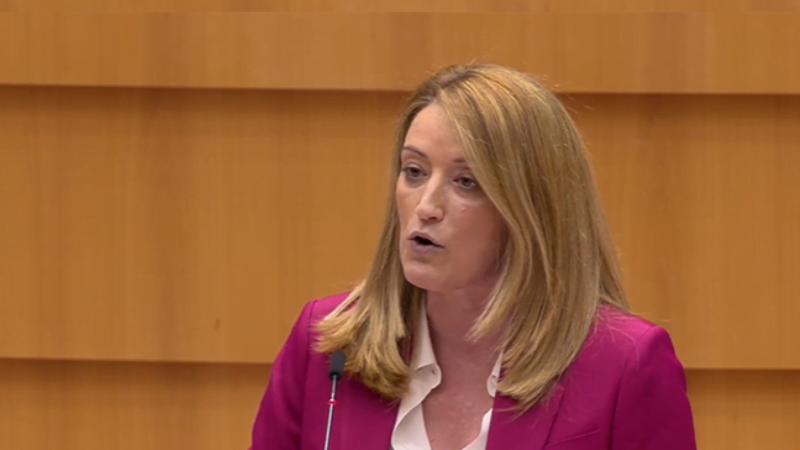Strategic Lawsuits Against Public Participation constitute a misuse of Member States’ justice systems and legal frameworks and are often “meritless”, “frivolous” and initiated for the purpose of intimidation, harassment, and psychologically pressuring journalists and members of civil society.
This is according to the draft report and motion for a European Parliament resolution, penned by Rapporteurs Tiemo Wolken and Roberta Metsola for the Committee on Legal Affairs Committee on Civil Liberties, Justice and Home Affairs.
The focus of the report is to strengthen democracy, media freedom, and pluralism in the EU and to protect journalists, NGOs and civil society from SLAPPs.
The report describes the current situation in the EU whereby SLAPPs are used to blackmail and silence critical voices through the use of judicial procedure. It notes that “this chilling effect can lead to self-censorship, suppressing participation in democratic life” and also discourage others from similar actions.
Those that use SLAPPs, it notes, “use and abuse criminal defamation laws” and civil suits as well as various other laws relating to copyright, labour sanctions, and data protection regulations.
They underline an “imbalance of power between the claimant and the defendant”, especially in terms of financial resources.
Member States lack a harmonised set of minimum standards to protect journalists, academics, civil society, NGOs, and to ensure that fundamental human rights are upheld. The fact that there is no targeted legislation in the bloc to protect against SLAPP is regretful and that the EU should commit to “the most ambitious legislation and best-practices ‘ to discourage their use.
The call for legislative action includes for Brussels I and Rome II Regulations to be amended to prevent libel tourism and for binding EU laws and a directive to be introduced.
Without such legislative action, the report argues, “SLAPPs will continue to threaten the rule of law and the fundamental rights of freedom of expression, association, and information.”
It also calls for defamation, a criminal offence in most Member States, to be controlled in a way that it cannot be used by SLAPPs. Furthermore, it asks that it be decriminalised completely.
Other possible measures include a fund to support victims of SLAPP, easy access to information and support, the formation of independent bodies to hear complaints, and proper training of judges and lawyers on the topic. It’s also essential to collect data on SLAPP cases and raise awareness on their impact.
The publication of the report comes just days after Vice-President of the European Commission Vera Jourova spoke of the promise she made to the family of assassinated journalist Daphne Caruana Galizia to better protect journalists in the European Union, including from SLAPPs.
Caruana Galizia was subjected to countless SLAPPs and vexatious lawsuits during her lifetime. At the time of her assassination, she had 42 lawsuits filed against her, most of which were from Maltese politicians. Many arestill pending and inherited by her family, despite calls for them to be dropped.
Jourova’s words came in theform of a letter, written as a response to concerns raised by a group of MEPs.
In their initial communication, they had expressed that the European Union needs to take steps to address lawsuits that are intended to “intimidate and silence people who raise their voices and call the public’s attention to pressing problems.”
In her reply, Jourova explained how she had committed to “mapping the possible situations of abuse of litigation against journalists” to determine the best solution to the issue.
She announced that the European Democracy Action Planwould be adopted by the end of the year. It aims to address threats and “improve the resilience of our democracies.” The plan will also include a response on how to tackle the problem of SLAPPs in the EU Member States.
Before it’s announcement, Jourova said that the Commission intends to launch a public consultation with key stakeholders to gather information on the issue and to consider possible initiatives.
Jourova called on journalists to use their expertise to be “the needed watchdogs for our democracies” and not fight abusive litigation.
“Since the beginning of my mandate, I have heard many stories of difficulties encountered directly from journalists or stakeholder organisations. Please, be reassured that I will look into all possible options to address this matter, in line with EU competence,” she reaffirmed.
In addition to the consultation and forthcoming action plan, Jourova said that two key pieces of legislation; Brussels I Regulation on jurisdiction and recognition and enforcement of judgments and the Rome II regulation of law applicable to non-contractual obligations, will also be reviewed.
Defamation is currently excluded from the scope of Rome II, but the Commission will analyse its inclusion in the context of the use of SLAPPs.
The Commission has commissioned a study on the application of Rome II, which will seek to identify divergences between Member States laws in the case of “cross-border violations of personality rights, including defamation.” Jourova added that they would also look at defamation suits and the misuse of legal proceedings against journalists.
SLAPPs have long been used to silence critical voices in Malta.
Caruana Galizia was subjected to many of these attempts, including from cash-for-passports concessionaire Henley and Partners. Her family then accused Mischon de Reya, a well-known law firm, of harassment, intimidation, and attempting to financially cripple her through UK-based legal action.
Henley and Partners and several others have also threatened The Shift with SLAPPs.
Pilatus Bank also threatened her with a lawsuit that would have been filed in the US. The now-defunct and disgraced bank also threatened various media houses in Malta.
The Shift also received a threat of SLAPP from Russian banker Ruben Vardanyan after reports he was linked to a multinational money laundering scheme called the Troika Laundromat.
The Maltese government has been reluctant to make any changes to national law to afford protection to journalists from SLAPP. In fact, they even gave their blessing for SLAPP to be used by Henley and Partners against Maltese journalists reporting on their activity.












